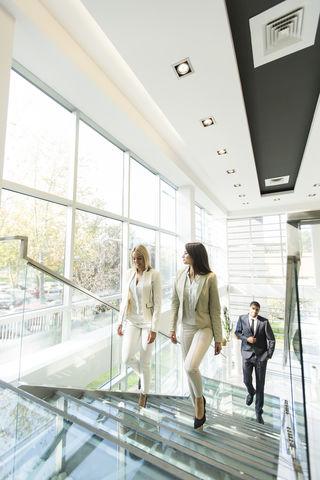
We
all know the feeling of craving an afternoon pick-me-up. Regardless of
how much sleep you’ve gotten the night before—afternoon is a time of day
when our hormonal and circadian rhythms seem hardwired to take a siesta
or power nap. Obviously, for anyone who is chronically sleep deprived,
the need for a midday jolt of energy to stay alert and keep chugging
along at work or school is going to be more pronounced. Unfortunately,
consuming caffeine
in the afternoon can create a vicious cycle of making it less likely
you'll sleep well that night, which will cause you to crave caffeine the
following afternoon...and so on, and so on.
But there is good news: The latest empirical evidence suggests that
10 minutes of walking or climbing a few flights of stairs is actually a
more effective way to boost your energy and vigor than consuming 50
milligrams of caffeine.
This first-of-its-kind study on the energizing benefits of small doses of physical activity compared to caffeine was conducted by Patrick O’Connor
and Derek Randolph from the Department of Kinesiology (Exercise Science
Programs) at the University of Georgia and published in the Journal of Physiology & Behavior.
Randolph and O’Connor were curious to see if a brief bout of exercise
or consuming a 50 mg caffeine tablet—which is roughly the equivalent of
a can of soda, cup of tea, or shot of espresso—provided
more of an energy boost for chronically sleep deprived adults (18-23
years of age) who frequently used caffeine to improve their afternoon
alertness.
The researchers state, “The acute energizing effect of exercise and
caffeine has never been examined in a single study of adults with
chronic sleep deprivation but evidence from a study of this type could
help individuals choose between these two common alertness-enhancing
options.” More specifically, the researchers found that the energizing
effect of 10 minutes of low-to-moderate intensity exercise was greater
than 50 mg caffeine for study participants who were sleeping less than 45 hours per week (under 6½ hours per night).
While designing the parameters of this study, O'Connor wanted to
simulate typical physical activity hurdles encountered by people who
work in an office. The researchers chose stair climbing as a form of
physical activity because most office workers have access to a stairwell
in which someone can casually slip away from his or her desk and
squeeze in a quick workout without needing to change into athletic gear
or shower before returning to work. Additionally, in terms of creating a
daily habit, taking a quick break from staring at your computer screen
to walk some stairs can become an afternoon routine that isn’t dependent
on weather conditions.
Although this study doesn’t address sleep hygiene directly, experts agree that consuming caffeine in the afternoon can disrupt evening sleep patterns and exacerbate insomnia. The American Sleep Association (ASA) tip sheet states,
“The effects of caffeine may last for several hours after ingestion.
Caffeine can fragment sleep, and cause difficulty initiating sleep. If
you drink caffeine, use it only before noon. Remember that soda and tea
contain caffeine as well.” (Sleep hygiene is defined as, “habits and practices that are conducive to sleeping well on a regular basis and having full daytime alertness.”)
The win-win of taking an afternoon walk or climbing some stairs to
boost energy instead of reaching for a caffeinated beverage is that
low-to-moderate intensity exercise will improve your physical and
psychological well-being in the short and long term, as well as help you
sleep better at night.
If you are experiencing an afternoon energy lull as you read this,
remember: Substituting a 10-minute dose of low-to-moderate intensity
exercise instead of an afternoon shot of caffeine is the perfect midday
energizer. Brief bouts of exercise can help break the vicious cycle of
caffeine-induced sleep deprivation while countering the overall
detriments of sedentarism and sitting too much during the day.
References
Derek D. Randolph, Patrick J. O'Connor. Stair walking is more energizing than low dose caffeine in sleep deprived young women, Physiology & Behavior (2017). DOI: 10.1016/j.physbeh.2017.03.013
No comments:
Post a Comment